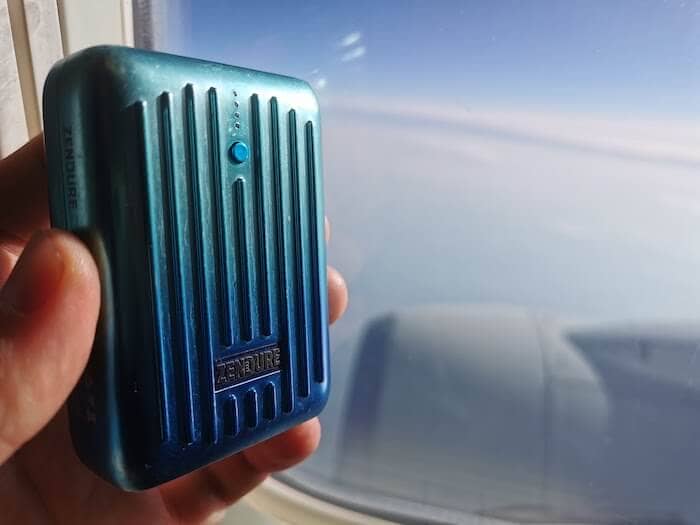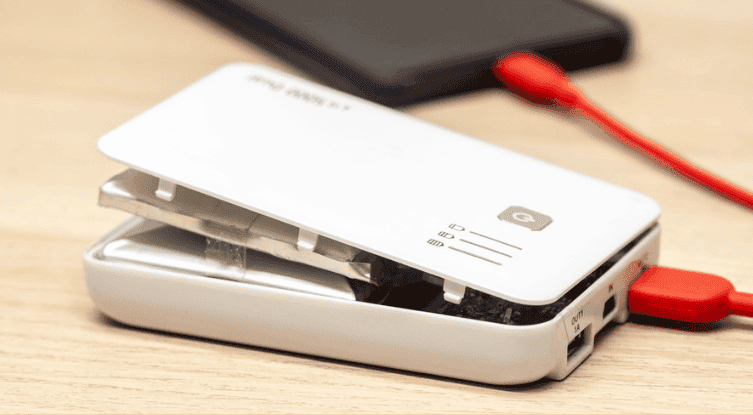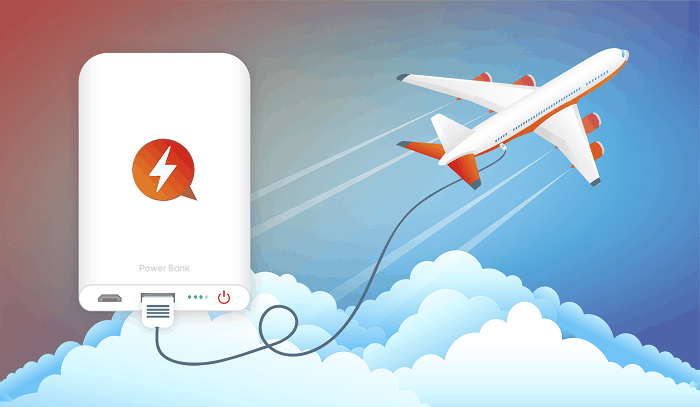EasyJet, like every other airline, has stringent policies regarding carrying battery-powered devices on flights. For instance, this airline allows only power banks with a maximum capacity of 160Wh, as per their dangerous goods rules. In addition, EasyJet mentions that passengers are only permitted to take power banks into the cabin.

How to Find Out the Wh Capacity of Your Power Bank
The power bank’s Wh capacity is often specified on the device, packaging, or user manual. Here’s an example where the Wh capacity is clearly specified on the portable charger itself.

Wh stands for watts per hour, which is the energy consumption of electrical equipment for an hour. The capacity can also be specified in mAh, which is the more common denomination when it comes to end-user marketing.
If your power bank doesn’t have this information printed on its casing or in the user manual, you can figure it out by typing in the mAh and voltage into our Wh calculator. You’ll be able to quickly convert any capacity from mAh to Wh, or the other way around.
How Many Batteries and Power Banks Can You Bring On an EasyJet Flight?
EasyJet has mentioned in its blog that carry-on luggage is limited to two spare lithium batteries. Lithium metal batteries with more than 2g of lithium but less than 8g are allowed exclusively for portable medical electronic equipment. There is also another important limit, of a maximum of 15 electronic devices per passenger.
More EasyJet Policies Regarding Rechargeable Batteries
EasyJet accepts gadgets with non-spillable batteries only if they are 12V or less and have a maximum capacity of 100Wh. Additionally, each passenger is permitted to bring no more than two spare batteries. According to EasyJet’s blog, travelers may bring them in both checked and carry-on luggage.
Lithium-ion Batteries
 Devices such as watches, calculators, cameras, phones, laptops, and camcorders contain lithium metal or lithium-ion cells or batteries; the lithium metal weight restriction is 2g, while the lithium-ion capacity limit is 100Wh. Also, these electronics are permitted in both checked and carry-on luggage, as long as they are solely for personal use.
Devices such as watches, calculators, cameras, phones, laptops, and camcorders contain lithium metal or lithium-ion cells or batteries; the lithium metal weight restriction is 2g, while the lithium-ion capacity limit is 100Wh. Also, these electronics are permitted in both checked and carry-on luggage, as long as they are solely for personal use.
In addition to this, all spare batteries for these portable electronic devices, including lithium metal or lithium-ion cells or batteries, must be carried only in carry-on luggage. Furthermore, these batteries must be individually protected in order to prevent short circuits from occurring. Last but not least, this airline permits the carrying of all electronic cigarettes, as well as two spare batteries, in carry-on baggage.
Smart Bags
Smart Bags work similarly to power banks in terms of charging devices and can be taken to the flight in checked bags and carry-on luggage. However, the battery should be disconnected in both cases, and the terminals protected against the short circuit. Bear in mind that if you want to bring the Smart Bag in checked baggage, you must carry the batteries to the cabin. Those who want to bring the Smart Bag to the cabin should also remove the battery and shield the terminals; but, you can keep the battery inside the bag once disconnected.
According to EasyJet, if the battery cannot be easily disconnected and removed from the Smart Bag, it will be denied flying approval. As a result, we recommend detaching the battery from the Smart Bag and covering the terminals prior to attending the airport. Also, avoid taking a Smart Bag with a non-removable battery to the airport since you may be asked to leave it there.
Batteries in Devices and Spare Batteries
When traveling with EasyJet, it’s important to distinguish between batteries that are installed in devices and spare batteries that you carry separately. Here’s what you need to know:
Batteries Installed in Devices
Devices such as laptops, smartphones, cameras, and other personal electronic devices often contain lithium metal or lithium-ion batteries. EasyJet permits these devices in both carry-on and checked luggage under certain conditions:
-
- Lithium metal batteries must not exceed 2 grams of lithium content.
- Lithium ion batteries must have a capacity of no more than 100 Wh.
Spare Batteries
All spare lithium metal or lithium ion batteries must be carried in your carry-on baggage only.
- Capacity Limits:
- Spare lithium ion batteries are allowed if their capacity does not exceed 160 Wh.
- For portable medical electronic devices, lithium metal batteries with a lithium content exceeding 2 g but not exceeding 8 g are permitted.
- Protection Measures: Each spare battery must be individually protected to prevent short circuits. This can be done by placing them in original retail packaging, by taping over the terminals, or by placing each battery in a separate plastic bag or protective pouch.
Additional Considerations
- Number of Devices: EasyJet allows a maximum of 15 portable electronic devices per passenger.
- Advance Arrangements: It is recommended that passengers make advance arrangements with EasyJet, especially when carrying medical devices.
Damaged/Defective Lithium Batteries
Traveling with damaged or defective lithium batteries poses significant safety risks. EasyJet has specific regulations to address these concerns:
- Prohibition of Damaged/Defective Batteries: Passengers are not allowed to carry items that contain damaged or defective lithium batteries on any EasyJet aircraft. This includes both installed batteries in devices and spare batteries.
- Recalled Products: If a product containing a lithium battery is subject to a safety recall related to the battery, it must not be carried aboard an aircraft unless:
- The recalled product/component guidance has been followed according to the manufacturer’s instructions.
- Passengers become aware of carrying a recalled device, they should immediately inform an EasyJet representative.
Safety First
- Visual Inspection: Before packing, visually inspect your batteries for any signs of damage, such as swelling, leakage, or deformities.

- Manufacturer’s Recall Information: Stay informed about any recalls related to your electronic devices or batteries by regularly checking the manufacturer’s website.
Why Are Airlines So Concerned With Batteries?
While batteries have enabled the dream of portable electronics to become a reality, they have also introduced several threats, such as devices catching fire and even exploding. Batteries have grown safer as a result of developments in this area.

Manufacturers, for example, have put smart circuits into power banks and batteries, which continually monitor the battery to avoid any malfunctions. However, if not used correctly, these batteries might create major incidents. For instance, if squeezed in a backpack or exposed to direct sunlight, portable electronic devices (PEDs) can catch fire. Airlines are concerned about batteries as a result of these threats.
Airlines have decided to allow the batteries and battery-powered gadgets exclusively to the cabin, ensuring that appropriate steps are taken in the event of an incident. Because if something occurs in someone’s checked baggage, nobody will know except the airplane’s fire sensor, and by then, it will very certainly be too late to return and do an emergency landing.
This is because damaged battery cells rapidly release stored energy (potential and chemical), generating extremely high temperatures (up to 600°C and more), resulting in smoke, fire, and flammable gas.
As a result, it is clear that batteries and power banks are not to be taken lightly, and EasyJet takes them seriously; nevertheless, this airline was not immune to the threats. For instance, easyJet #U28335 London Gatwick to Toulouse (Airbus A320 G-EZTN) returned to the gate twice in less than an hour, according to a tweet from Airport Webcams on March 3, 2019.
Conclusion
EasyJet allows passengers to bring power banks or rechargeable batteries on board if they have a maximum capacity of 160Wh.
To be on the safe side, you should always read the airline’s guidelines and comply with the restrictions, especially those related to batteries. Because, in addition to the dangers posed by Lithium-ion batteries, you may be required to leave your pricey devices at the airport.
If you’re interested in learning more about Transportation Security Administration (TSA) regulations, we recommend reading this article: Can you bring portable chargers on a plane? 3 TSA rules you need to know.
